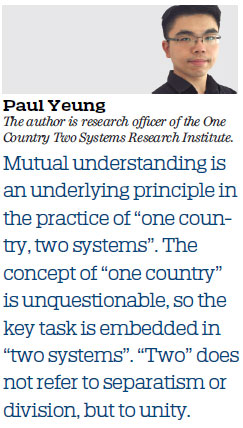Mutual understanding is vital in promoting social harmony
Updated: 2019-06-20 07:30
By Paul Yeung(HK Edition)
|
|||||||
Last week was a very difficult time for all those who love Hong Kong. It's a great but costly lesson for the special administrative region. What did we learn from this? The most remarkable thing should be the importance of mutual understanding and respect. When we look at the extradition law amendment controversy, it started from a lack of understanding of the concerns and opinions of the other side.
The dispute over the extradition bill is not a singular issue in the practice of "one country, two systems". It is a typical case of not treating the differences between "two systems" correctly. Hong Kong is a free society with diverse opinions. If we cannot build an effective communication system to meet public expectations, controversy will only lead to social disputes again and again. Understanding is the core quality which we should all learn.
Mutual understanding may not always be easy. You can start by understanding yourself. During times when controversial issues rock society, many people seek professional counseling services. Some non-government organizations providing mental counseling services suggest that you should take care of yourself first when you feel upset during such difficult situations. For instance, if you feel insecure and uncomfortable over a contentious issue, you should be aware of and accept your own feelings and emotions. You should also take a break for a while, by not reading any information on the controversial issue. If you need to talk, you should chat with a reliable person or call hotlines of organizations providing psychological support services. The reason why you should first approach this from an individual basis is that thousands of single actions can lead to collective actions.

The next step is to achieve a mutual understanding with another person and his family or friends. It is common, but sad, to hear that lots of conflicts happened between friends and even family members because of controversial political and social issues. Hong Kong residents enjoy the right to express their views on public issues based on different values, but in doing this it is not necessary to hurt interpersonal relations, which is not useful for discussions. Here we come to another key concept called "non-violent communication". The principle of non-violent communication is simple - mutual respect. All human beings, regardless of their backgrounds and political views, share the same basic need: To eliminate fear. Based on this understanding, we can check our intentions to see whether we are as interested in other people's needs as we are in our own. Before agreeing or disagreeing with someone's opinions, we should try to understand what that person is feeling and thinking. What is most critical is that instead of saying "No", we should try to express our words in a positive way. Non-violent communication between two people could be crucial steps to achieving peace and harmony in society.
When we come to society as a whole, social harmony must be the ultimate goal. There will not be a good outcome if peace and harmony are hurt and hate is spread. Don't rush to blame people who have opposing views before a relatively high level of understanding can be achieved. Chief Executive Carrie Lam Cheng Yuet-ngor issued her apology over her handling of the extradition law amendments on Tuesday. It was very important that she admitted there were deficiencies in the government's work over the fugitive law amendment exercise, which led to disputes, unrest and anxiety in society. It is necessary to promote social harmony by realizing there are gaps in our understanding of issues. Another notable example was the demonstration on Sunday. This surprisingly peaceful demonstration was not only achieved by protesters but also through cooperative action by police officers. Social harmony is always a collective effort from different sides. The younger generation should put more effort into peaceful and constructive engagement - such as the Member Self-recommendation Scheme for Youth, which just began its latest round of membership applications this week.
Mutual understanding is an underlying principle in the practice of "one country, two systems". The concept of "one country" is unquestionable, so the key task is embedded in "two systems". "Two" does not refer to separatism or division, but to unity. To achieve unity and understanding, respect is the key. Thich Nhat Hanh, a great Buddhist master, wrote a poem: "Man is not the enemy. Our enemy is hatred, anger, ignorance and fear." The roots of social disorder are misunderstanding, fear, anger, and hatred. That's the lesson to be learned from the fugitive law amendment controversy.
(HK Edition 06/20/2019 page8)